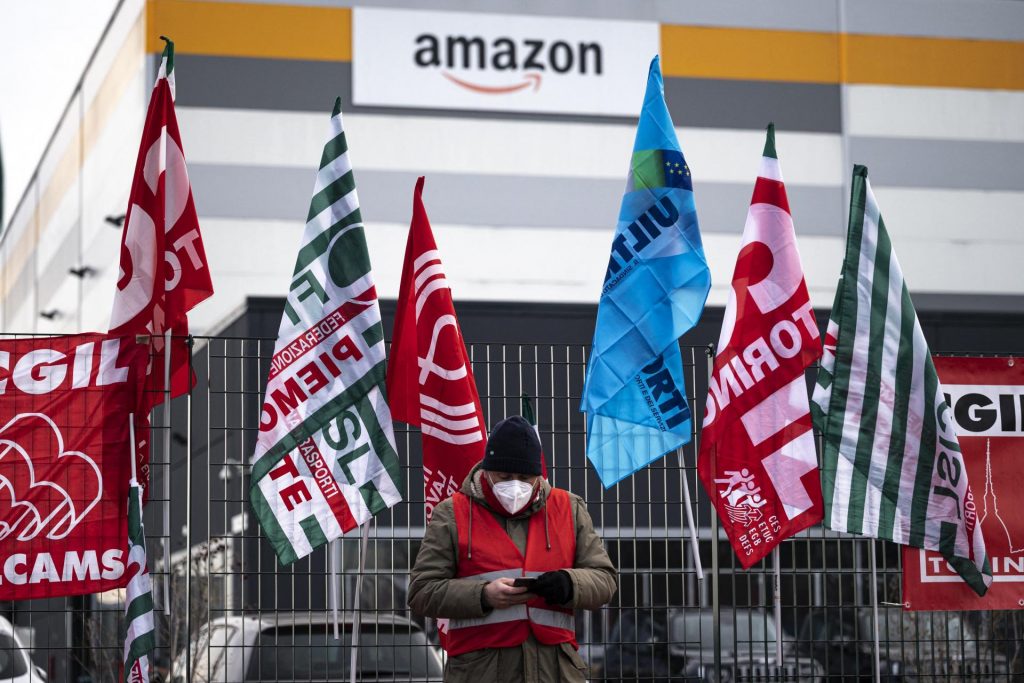We can undoubtedly say that last Tuesday was a historic day in Italy: for the first time in Europe, a 24-hour strike affected Amazon across its entire supply chain. Out of 40,000 total workers — both those employed directly by Amazon and those working for subcontractors — several thousands joined the strike.
The strike took place in the middle of the “third wave” of the coronavirus pandemic. Italy, a country of 60 million people, has more than 20,000 new infections and 300 to 400 deaths each day. The entire country will remain in a state of semi-quarantine until the first week of April. The vaccination campaign is also far behind schedule — only 8 million people have been vaccinated so far.
In this terrible crisis, the bureaucracies of the three big Italian unions — CGIL, CISL, and UIL — have supported the country’s capitalist government. Union leaders had already been supporting the coalition government of the Democratic Party and the 5 Star Movement led by Giuseppe Conte. But now they have increased their support for the new government of former European Central Bank president Mario Draghi. Even more than his predecessor, Draghi supports the policies of the Confindustria, the association of industrial capitalists. Conte had to resign because he was not fulfilling all of industry’s wishes, and a new majority was formed without new elections, thanks to the extraordinary pressure used by President Sergio Mattarella.
Italy’s logistics sector offers little security for workers. There are new attempts to make working conditions more precarious in every sector, and more than 100,000 workers have been fired during 2020, despite an official “layoff freeze” until next June. Nonetheless, logistics workers have been among the most active sectors of the working class during the pandemic.
Amazon has had the advantage of being a relatively new company in Italy. But it is expanding rapidly, and, if one counts direct employees and subcontracted workers, around 40,000 people already work for Amazon across the country. The subcontractors are mostly drivers. The unionization process is still very initial, but the brutal working conditions, with unsustainable rhythms and precarious, short-term contracts for almost all the drivers, have built up widespread anger and exasperation across Italy.
The company fanned the flames, rejecting any real negotiations with the representatives of the big unions, even though union leaders in the logistics sector have maintained a pro-business attitude for decades. The passivity of the big unions left ample room for grassroots unionism to take root in this sector, especially in northern Italy, the most industrialized part of the country. A large number of logistics workers are immigrants, mostly from eastern Europe, Africa, and Asia.
The big unions finally decided to call for a one-day strike across Amazon’s entire supply chain on March 23. Their demands were for better pay (especially for overtime work), a marginal decrease in weekly working hours for drivers (from 44 to 42), and better conditions of work. This especially applies to subcontracted drivers who are not protected if their vehicles suffer damage or if they are unable to deliver huge numbers of packages every day.
A First Defeat for Bezos
The unions reported that about 75 percent of workers participated, which comes out to about 30,000 workers. This is probably an exaggeration, except for some regions like Tuscany and Lombardy where the participation was very high. There is no doubt, however, that several thousand Amazon workers went on strike last Tuesday. This is the first big defeat for Jeff Bezos’ company in Italy. Amazon has gotten a lot of negative attention in the media, and is facing a national boycott campaign by consumers. Nonetheless, the bureaucracies of the big unions are still trying to avoid any serious conflict with the government or the employers’ associations. This greatly weakened the strike, keeping it isolated from other nationwide strikes that are set to take place this month.
This day of action has created new potential for workers’ struggle in a strategic sector of capitalism in Italy and internationally, for several reasons.
It means that union structures will take root inside Amazon in Italy, which until recently seemed impossible. This will help continue the struggle for better working conditions and less precarious contracts.
Until now, Amazon has only seen either social peace or micro-strikes. This phase is being overcome, and there is now a perspective for large numbers of workers to join the struggle. This also opens the possibility of coordination and active solidarity with Amazon workers in other countries.
The bureaucracies of the big unions only want to be recognized as negotiating partners by the company and the government. In order to prove their usefulness to the ruling class, they need to show they can hold back the workers. During the last strike, they prohibited workers from picketing. This policy by the bureaucrats could lead the workers to take charge of their struggle using means of self-organization and workers’ democracy.
For years, a sector of logistics workers have been fighting for better conditions — this sector is still a minority, but large enough to worry the bosses. This strike will give a big boost to that sector. Not only that: it can lead to more questioning of the union bureaucracy, with their pro-business views. It will also challenge the limits of small, grassroots unions who only make demands at the level of individual companies.
In the last year, the “Amazonocracy,” the rule of a few huge companies, has gained power in Italy as in other countries. The only real opposition to these behemoths will not be found in the false promises of government parties. Only the united struggle of all the Amazon workers can show the path forward.











